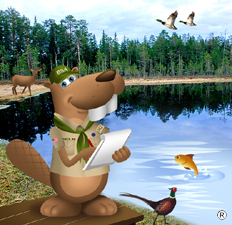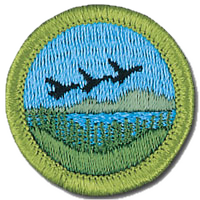Fish and Wildlife Management


Resources
Fish and Wildlife Management Requirements
Current Scouts BSA requirements
as of February 19, 2026
as of February 19, 2026
NOTE: Scouts must remember to follow the Leave No Trace Seven
Principles and the Outdoor Code while on field trips and when collecting
specimens. Make sure you have permission of the land manager prior to
taking any samples.
Your state may require that you purchase and carry a license to
collect certain species. Check with the wildlife and fish and game
officials in your state regarding species regulations before you begin to
collect.
1.
Describe the meaning and purposes of fish and wildlife conservation and
management.
2.
List and discuss at least three major problems that continue to threaten
your state's fish and wildlife resources.
3.
Describe some ways in which everyone can help with fish and wildlife
conservation.
4.
List and describe five major fish and wildlife management practices used by
managers in your state.
5.
Do ONE of the following:
a.
Construct, erect, and check regularly at least two artificial nest
boxes (wood duck, bluebird, squirrel, etc.) and keep written records
for one nesting season.
b.
Construct, erect, and check regularly bird feeders and keep written
records daily over a two-week period of the kinds of birds visiting the
feeders.
c.
Develop and implement a fishery improvement project or a backyard
wildlife habitat improvement project. Share the results with your
counselor.
d.
Design and construct a wildlife blind near a game trail, water hole,
salt lick, bird feeder, or birdbath and take good photographs or make
sketches from the blind of any combination of 10 wild birds, mammals,
reptiles, or amphibians.
6.
Do ONE of the following:
a.
Observe and record 25 species of wildlife. Your list may include
mammals, birds, reptiles, amphibians, and fish. Write down when and
where each animal was seen.
b.
List the wildlife species in your state that are classified as
endangered, threatened, exotic, non-native, game species, furbearers,
or migratory game birds. Discuss with your counselor management
practices in place or being developed for at least three of these
species.
c.
Start a scrapbook of North American fish and wildlife. Insert markers
to divide the book into separate parts for mammals, birds, reptiles,
amphibians, and fish. Collect articles on such subjects as life
histories, habitat, behavior, and feeding habits on all of the five
categories and place them in your notebook accordingly. Articles and
pictures may be taken from newspapers or science, nature, and outdoor
magazines, or from other sources including the internet (with your
parent or guardian's permission). Enter at least five articles on
mammals, five on birds, five on reptiles, five on amphibians, and five
on fish. Put each animal on a separate sheet in alphabetical order.
Include pictures whenever possible.
7.
Do ONE of the following:
a.
Determine the age of five species of fish from scale samples or
identify various age classes of one species in a lake and report the
results.
b.
Conduct a creel census on a small lake to estimate catch per unit
effort and report the results to your counselor.
c.
Examine the stomach contents of three fish and record the findings. It
is not necessary to catch any fish for this option.
d.
Make a freshwater aquarium. Include at least four species of native
plants and four species of animal life, such as whirligig beetles,
freshwater shrimp, tadpoles, water snails, and golden shiners. After 60
days of observation, discuss with your counselor the life cycles, food
chains, and management needs you have recognized. Before completing
this requirement, check local laws on releasing these organisms back
into the wild, and follow your counselor's direction in disposing of
these organisms humanely and safely.
8.
Identify three career opportunities that would use skills and knowledge by
fish and wildlife professionals. Pick one and research the training,
education, certification requirements, experience, and expenses associated
with entering the field. Research the prospects for employment, starting
salary, advancement opportunities and career goals associated with this
career. Discuss what you learned with your counselor and whether you might
be interested in this career.